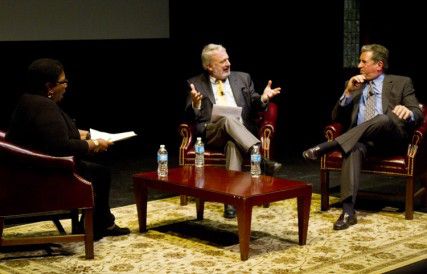Discussion of advertisements featuring U.S. Sen. Scott Brown’s laundry-folding skills and the political jiujutsu in the Massachusetts Senate race entertained a crowd of viewers on Wednesday, as political experts analyzed short advertisement and debate clips of Brown and his Democratic opponent Elizabeth Warren.

About 65 people attended the discussion, with some members laughing as discussions swayed from an early biographical Brown advertisement to the portrayal of Warren as an insurance-friendly attorney.
“It’s a very difficult and unique set of skills that go into making a really competent candidate, so the first thing is introducing yourself,” said Michael Shea, a Democratic political consultant.
Bruce Mohl, editor of Commonwealth Magazine, moderated the evening, which was organized by the independent think tank Mass Inc. and held at Suffolk University.
Callie Crossley, a radio host at WGBH, asked political analyst Todd Domke and Shea to consult and analyze three sets of advertisements by each candidate.
Domke said the candidates did not make good use of their money and could have done more original work with original music.
“The bottom line I would say about the ad wars is that 10s of millions have been spent, but, as in the presidential race, we see little effect,” Domke said.
Shea said Warren had to fight against Brown’s incumbency and tried to link him to the national Republican party, something Brown worked against.
“[The] more difficult task for Scott Brown is to convince people he is not Republican,” Shea said.
Shea said Brown’s strength came from a great story and a hard background, which the public likes.
In the final set of advertisements, Warren was portrayed as working in the unpopular areas of insurance and as an attorney.
This did not work to Brown’s advantage, Domke said.
Shea had a similar opinion.
“This stuff might work in East Texas — it doesn’t work in Massachusetts,” Shea said. “We have a very sophisticated elective, very smart compared to the rest of the country.”
Shea said this was a turning point in Brown’s campaign, which will make it harder for him to win.
In the second part of the evening, Boston Globe columnist Scot Lehigh and Carole Simpson, former ABC news anchor, said the debates hurt Brown.
Lehigh said Warren did not make the debate personal, but Brown kept pressing Warren’s ancestral background to Native Americans even after polls showed people are “sick” of the issue.
Brown is “rolling burning barrels from the back of his truck,” Lehigh said.
“He is trying to say, ‘this woman is so dubious, she is so sketchy, so dodgy that you really shouldn’t vote for her,’” Lehigh said.
Warren focused on the idea that if people did not like her, they should still vote for her to have a Democratic Senate, he said.
Simpson said that having covered and moderated a presidential debate, she took a different position to that of Lehigh.
“What I learned from people is that, they’re looking at the atmospheres, they’re looking at the physical appearances, they’re looking at the sound of the voice,” Simpson said.
Mohl closed the debate by interviewing Robert Rosenthal, associate professor and chair of the department of communications and journalism at Suffolk, who called the media’s coverage of the race mediocre.
“The media’s job is to make sure that their [government officials’] feet are held to the fire,” Rosenthal said. “We probably don’t do that enough in this country.”
Rosenthal said he would like to see news conferences in which working reporters who do reporting can ask follow up questions to “really put candidates through the test.”
Jacquelyn Vadnais, 25, and Jeremy Worthington, 24, of Back Bay, said they do not have a television and enjoyed seeing the ad coverage.
Worthington said both of them worked on Capitol Hill in the past.
“To see what is happening behind the scene [is good],” Worthington said about the strategies candidates used.
This is an account occasionally used by the Daily Free Press editors to post archived posts from previous iterations of the site or otherwise for special circumstance publications. See authorship info on the byline at the top of the page.



